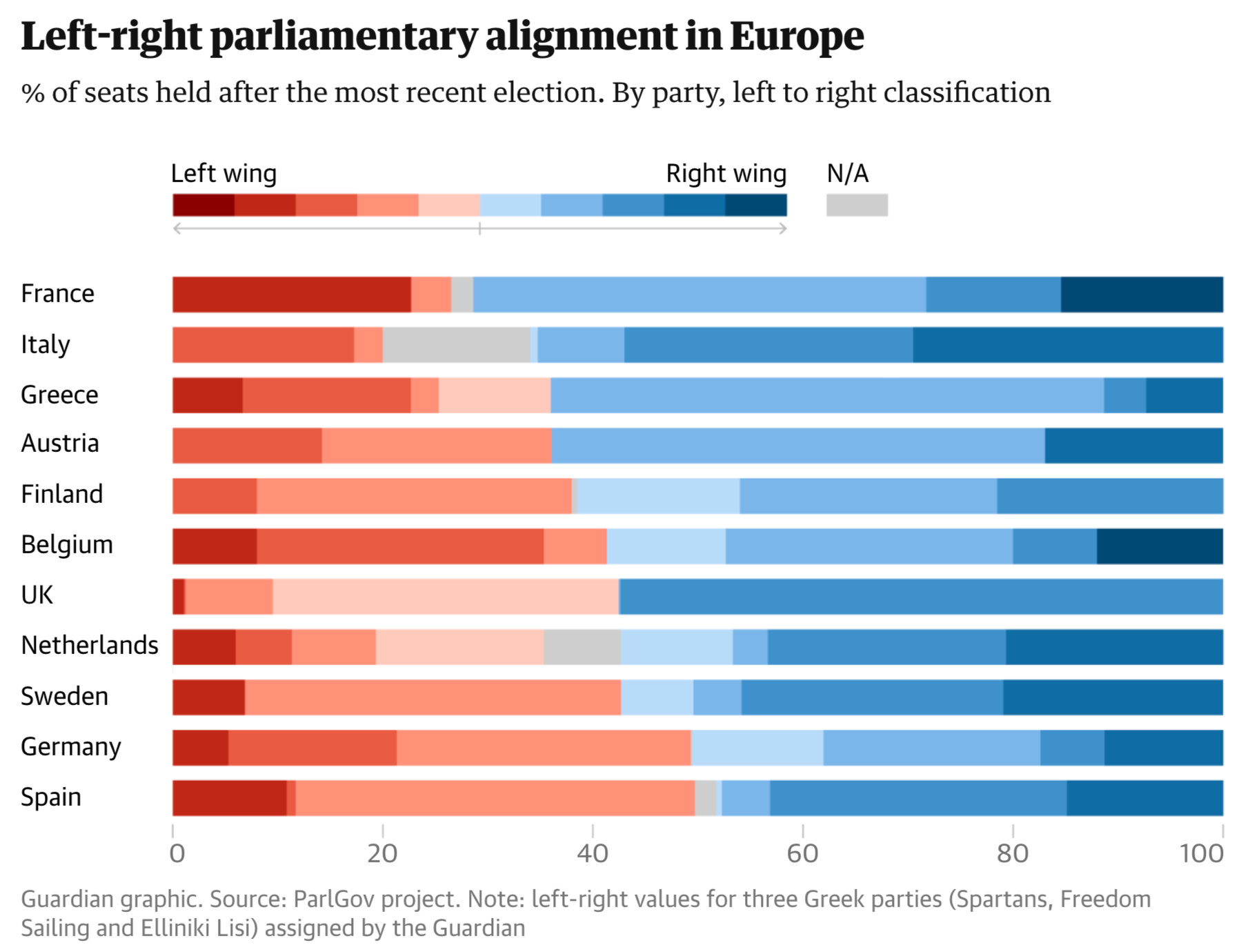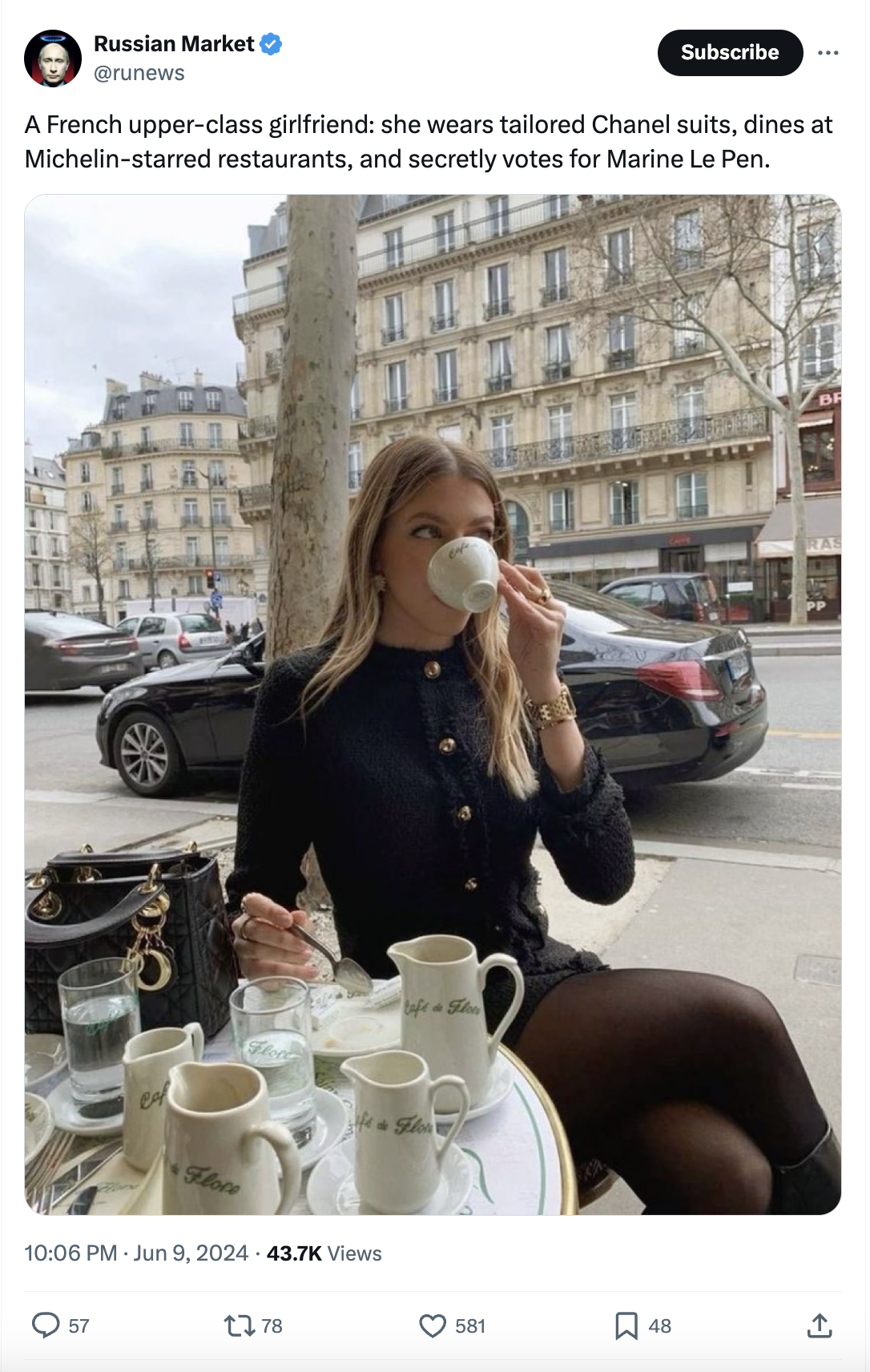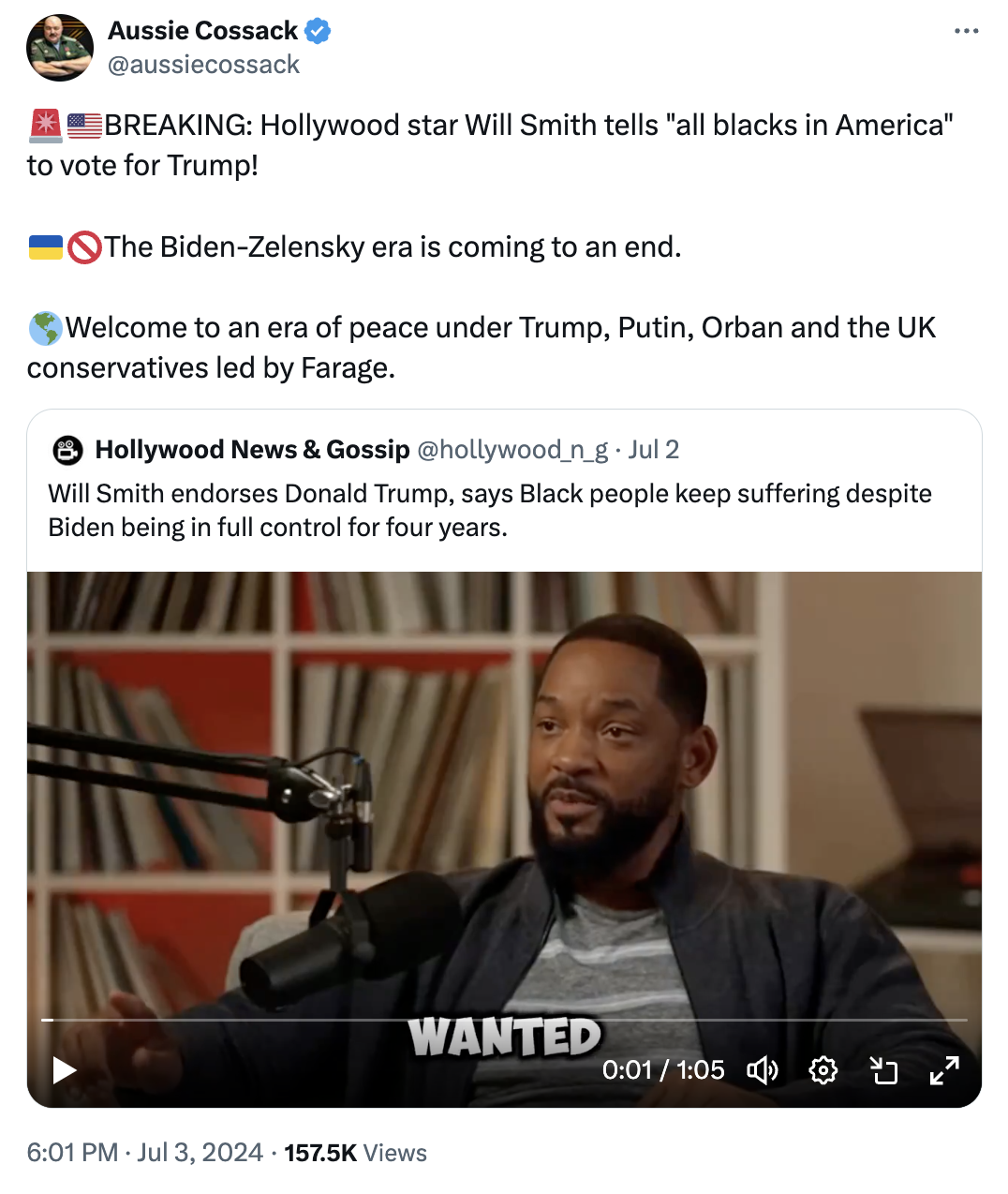The People vs Polarisation
Can we really blame social media for the rise of the far right? 🤨

Happy election day to folk in the UK! Welcome to the second issue of The People, a bi-weekly newsletter from The People vs Big Tech and the Citizens.
Each issue we’re tackling one online topic with the help of guest experts. This week The People is brought to you (again) by me, Alice McCool and it felt fitting to focus on political polarisation as 2024 seems to be one long election season. Around the world we’re seeing a move towards ideological extremes, particularly the far right. The reasons behind this are complex, from apathy towards centrism amidst economic decline, to migration rates which continue to rise as the climate crisis intensifies.
Western politicians are failing to respond to these problems. Trust in our political systems is being eroded. And extremist views are gaining ground.

On that cheery note, join me as I dig into how much of a role Big Tech is playing in amplifying all of this. As much as I’d just - ahem - love to focus on the UK, I’ll mainly be looking at France where a snap election is underway. At the time of writing there’s a very real possibility that the far right National Rally (RN) could secure a majority after winning the first round of French Assembly elections, with President Macron’s party trailing behind in third.
Le babes for Le Pen 💋

When I heard that deepfake TikToks of hot, young, far-right women posing as relatives of Marine Le Pen had been circulating online, I thought I had the perfect buzzy start to this newsletter.
But screenshots of the accounts I found stated clearly that they are generated by AI, and according to Julie Charpentrat from AFP (Agence France-Presse) Fact Check, TikTok suppressed them quickly. Julie also told me that her team didn’t end up producing a report on the videos because they were “presented and taken as humoristic.” President of the RN (and Le Pen prodigy) Jordan Bardella condemned the videos, and one of the anonymous account owners described them as a social experiment(!?) and said there was “nothing political” about them.
Curiously, Julie said this is fairly representative of AFP’s monitoring during the French and European elections this year. They just haven’t seen the floods of misinformation they were expecting. Her theory is that bad actors don’t need to do much “because there’s already political and information chaos” in France. Xavier Brandao, from #Jesuislà, a collective fighting online hate, made the grim point that “if we already have such polarising figures they don’t need to generate fake videos.” Besides, influencers are probably more impactful than AI fakes, so some propagandists (like China) just hire those voices instead.
Not as sexy a story as I thought, perhaps. Though I don’t think all this takes away from the fact that within the millions of TikTok users who viewed these deepfakes, some will have taken them seriously. And even for those who didn’t, influencer style content like this no doubt normalises extreme right views - and could even make them cool. Bardella is already hugely popular on TikTok with close to 2 million followers, with his right wing populist contemporaries in other EU countries and the UK also “winning” on the platform. In fact, a quick search of #bardella on TikTok this morning came up with plenty of seemingly real videos of young white women lip syncing to pop songs alongside pro RN on-screen text.
I asked Thomas Huchon, a French journalist and academic focused on fake news, why Bardella is so big on TikTok. “Moderate political discourse doesn’t have an audience because it doesn’t use the right triggers on social media - anger, disgust, violence, shock,” he said. The far right, meanwhile, relies much more on emotionally charged messaging than other political ideologies (including the far left) which require more reflection, he added. This kind of content is “what the algorithm is looking for” to catch our attention (and our all important clicks 🤑), he said. “So the design of social media platforms helps a Donald Trump more than a Bernie Sanders.”

It’s not just TikTok though. A friend told me about a post she’d come across on English-speaking Twitter: (yet another) image of a young white woman with the caption “French upper-class girlfriend: she wears tailored Chanel suits, dines at Michelin-starred restaurants, and secretly votes for Marine Le Pen.” Playing on the chic Parisienne girl stereotype which exists in the minds of some English speakers, the original post from an account which mainly posts memes glamorising fascism gained nearly 45 million views.
Later that day, a new post featuring the same photo and near identical text was posted by @runews, a well known pro-Russian account with over 333,000 followers which gained a blue tick in January. According to the Washington Post, in February Elon Musk boosted the account’s profile on X by responding positively to a false claim the account made about NATO soldiers in Ukraine. Hmm.
It seems to me that satirical or not, out-of-context messaging on social media removes nuance and increases the risk of polarised thinking. From the algorithm’s perspective, if it contains extreme ideas - even better. And Putin’s propaganda accounts might be into it too.
Déjà vu 😶🌫️
I started with sexy deepfakes and now I’m at Russian influence operations. Sorry about that.
It's not that generative AI isn't an issue. Earlier this week a known pro-Putin account posted a deepfake video of a fictitious employee of the Bugatti car dealership in Paris, where it claimed the wife of the Ukrainian president had recently bought a 4.5 million euro car. It gained 5 million views, and like the 'upper class girlfriend' post appeared to target English-speaking audiences.
Yesterday, the same account posted another video which appears to be fake, claiming to be Will Smith encouraging Black people to vote for Trump was posted on Twitter. Interesting considering a Senate investigation into the 2016 US election concluded that a Russian fake-news campaign targeted "no single group...more than African-Americans." How is this still happening?

In truth though - and here comes the Déjà vu - the main red flag which came up in my conversations with experts in France was good old Russian adverts on Facebook. We’re seeing that blast from the past in the UK too: last week a network of pro-Russian, anti-Ukraine Facebook accounts in the UK was uncovered by ABC and the Bureau of Investigative Journalism, with some posting in support of Nigel Farage’s right wing populist Reform UK.
The investigation found that right and left wing accounts in the network “appear to act in coordination, often repurposing the same content for different means.” And no doubt you’d be shown whichever content the algorithm thinks you’d find most appealing - a feature which many experts say creates echo chambers, often leading to polarised thinking. Read more on this in our Misogyny issue.

“Polarisation creates a kind of social unrest. And it's definitely one of the objectives of the Kremlin to create social unrest in what's considered to be strategic adversaries,” said Marc Faddoul, director of AI Forensics. His team also recently uncovered a Russian propaganda Facebook ad network which reached over 38 million accounts in France and Germany between August 2023 and March 2024. The ads “weaponise news events,” such as the farmers protests and military aid packages, to undermine support for Ukraine and institutional support in the EU.
A report focused on Russian campaigns on Twitter found the Kremlin has also sought to divide an alliance of parties against the far right both by targeting President Macron, and pushing a perception of socialist party La France Insoumise as Islamic extremists. According to the report, these narratives attempt to reinforce conflicting views on Israel/Palestine. Ongoing investigations in France even suggest graffiti in Paris relating to the conflict has been commissioned by Russia. This included around 250 blue Star of Davids which stirred up division and caused confusion around whether they were pro or anti-Israel. Such acts were then posted online by propagandists, polarising communities further.
Back to the ads. Despite the EU Commission launching an investigation into Meta following AI Forensics’ work, ads in violation of the platform’s rules are still currently running in France in the middle of the country’s election. One recent post celebrated Bardella’s success in the EU elections and complained about “the large number of foreign visitors from Africa.” Another suggested France would be “much better off making peace with Ru [Russia] and buying cheap fuel from them again.”
With the French snap elections in less than two weeks, Meta seems not to have implemented any systemic fixes. They recently approved Doppelgänger ads congratulating the far-right for their EU election results, framing it as revenge for Macron's support of Ukraine. pic.twitter.com/Kc1MZp5qv4
— Paul Bouchaud (@P_Bouchaud) June 19, 2024
AI Forensics also found that the network had put out ads on Meta with photos of celebrities next to fake quotes about Russia/Ukraine, reaching up to 15 million Facebook accounts in France and Germany:


It’s wild to me that ads like these are still running during our election campaigns. But I guess it's also not surprising that Putin and Big Tech are in some kind of symbiotic relationship. I thought Marc put this perfectly (don’t worry if you need to read it twice):
“The engagement centric design of recommender systems on social media is being exploited by malign actors to promote polarising content at scale. This content, by default, tends to then be amplified by these algorithms due to its ability to generate engagement.”
A letter from France 🇫🇷🇫🇷
Saying all that, I don’t want to overplay Russia’s role in this. In May, OpenAI also removed influence operations based in Israel, China and Iran. And I can also safely say that in the UK at least (and I’m sure the rest of the West) there are plenty of ways we have created our own polarised mess. When I asked expert researchers, activists and journalists in France about division in their country, they generally agreed on three points:
- The algorithm erases nuanced opinions, which particularly favours the far right
- Traditional media and politicians are doing a great job of dividing us too
- Polarisation puts vulnerable and minoritised groups at most risk
I’ll leave you with what Xavier Brandao from #Jesuislà said:
“Big Tech is of course a huge culprit. Fixing the algorithm would play a big part in fighting polarisation. We need safety by design and default, content from reputable sources amplified, and algorithms which bring content that can appeal both to the left and the right, so at least there can be some common ground in the public discussion. And no more infinite scrolling.
But we shouldn't forget that political propaganda has always existed. I think polarisation is being done on purpose as a political strategy, for example presenting the left as extremists because of their support for Palestinians. We also shouldn’t underestimate the power of traditional media. The newspaper Le Figaro, for example, used to be right but in my opinion it has now become far right - it’s extremely conservative and xenophobic. And we have Vincent Bolloré, a billionaire who funds right wing propaganda programmes on TV here.
So all types of media have played a role in turning extreme views up a notch. And we are seeing more acts of violence from Neo Nazi groups because they are emboldened. There was recently a video of two people shouting racist slurs at a Black woman, and referencing content they’d seen on TV.”
Actions you can take ✊
- If you’re aged 16-25 year-old based in Denmark, France, Germany, Ireland, Poland, Spain or the UK, apply to join our youth campaign! You’ll attend a creative boot camp, advocate at the EU and feature in a global documentary.
- Only messages that elicit empathy with people affected by hate speech are likely to persuade the senders to change their behaviour, research by ETH Zurich has found - so bear this in mind if you encounter hateful content online 💓
- It’s possible for Big Tech companies to bridge divides. Learn about how and show your elected representatives that you care about this issue - and want them to do something about it.
- Want your team at work better informed about these issues? Book an interactive training on how to deal with online information manipulation, disinformation, conspiracy theories, and propaganda with experts at Defend Democracy. Fees are tailored according to the budget of your organisation.
People Vs Big Tech is a collective of more than one hundred tech justice organisations around the world. This means we’re putting together each newsletter with the help of some of the planet’s smartest and most respected experts in this field. Email bigtechstories@the-citizens.com if you have an idea for a Big Tech issue you'd like us to cover.

